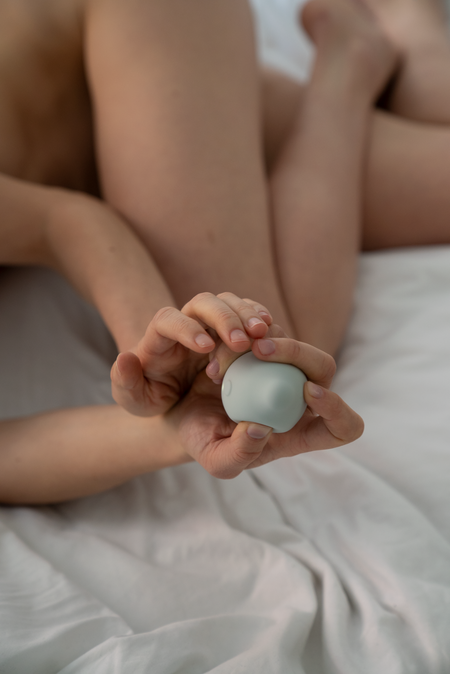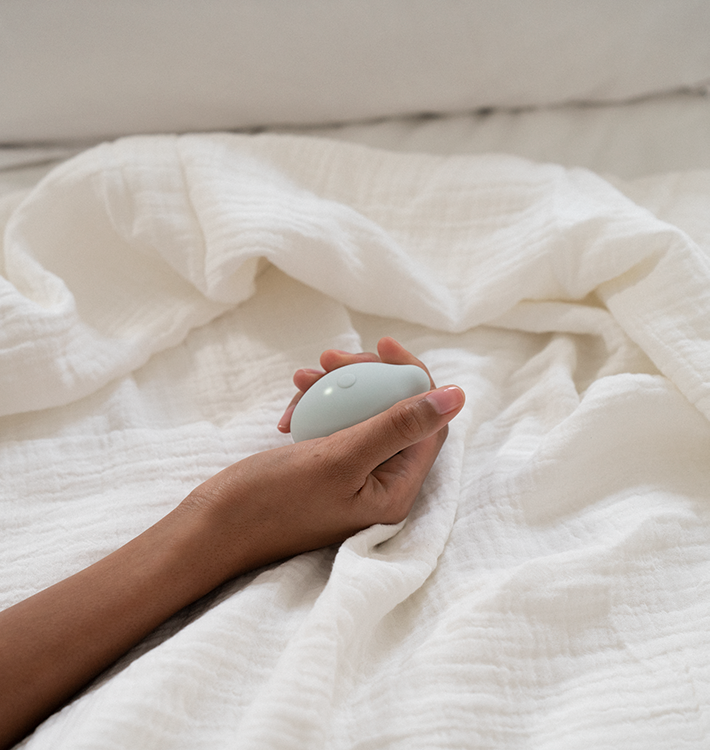Why A Vibrator Is One of the Most Important Sex Toys for Menopausal Women to Own
You probably know the effects of menopause, but you might be wondering the more critical question: how do I overcome those effects to kickstart my sex life?
We're here with some suggestions on how to cure those tell-tale menopause symptoms: vaginal dryness and issues reaching orgasm. For your well-being and sexual health, there are many things you can do to keep your sexual response vibrant.
How does menopause affect your sexual response?
First, it's essential to understand your clitoris' effect on your sexual response. When you become stimulated during foreplay or penetrative sex, a rush of blood goes to your clitoris and causes it to enlarge, similar to how a penis becomes erect. With that increase in blood flow, the clitoris also releases lubrication.
Remember, the clitoris is more than the gland you can see outside of your body. It extends upward, throughout your pelvic muscles, which in turn stimulates your vaginal walls. The increased blood flow has a tightening effect, which helps you reach orgasm.
After menopause, your ovaries stop producing estrogen and progesterone. Losing those two hormones doesn't just cause hot flashes. Without estrogen, your vaginal tissues become thinner, potentially including the clitoral region. Your vaginal canal becomes drier, shorter, and narrower. You might notice your clitoris is smaller. The thinning of vaginal tissues is known as 'vaginal atrophy' and can lead to painful sex.
8 Ways for Menopausal Women to Get Orgasming Again
Luckily, there are many ways to overcome sexual problems as menopausal women. Here are our eight top ways to adapt to your changing health both during and after menopause:
1. Invest in a clitoral vibrator
Since there may be less surface area to one's clitoris, giving the clitoral region more direct attention can be a great place to start. An external massager or vibrator is the best way to make sure you. Look for a sex toy made of medical-grade silicone, with varying speeds so that you can adjust as you might discover your sexual response changing further throughout your life. If you plan to use it with a partner during penetrative sex, an external massager is the way to go.
We've rounded up our favorite all-time clitoral vibrators in a post here. And of course, there's always our very own vibe: Limon, a rechargeable, intuitive, and discreet external vibrator. It's an excellent vibrator for menopausal women, made from smooth, medical-grade silicone, and ergonomic design that makes it ideal for solo play or penetrative sex. Just squeeze to increase its intensity, making it a responsive partner to any sexual response.
Clitoral stimulation is vital at any age or stage of sexual health, so we recommend a vibe for everyone as
2. Add Kegels to your daily exercise routine
Kegels are the best way to work out your pelvic floor muscles. And strong pelvic floor muscles lead to intense orgasms.
Are you interested in learning how to kegel? Here's a crash course: Lay down on your bed. Now, tighten the muscles you'd usually use to stop a stream of pee. Those are your pelvic floor muscles. Hold tightly for 3-6 seconds. Relax for 10 seconds, and hold again for 3-6 seconds. Do that ten times.
Since you should practice Kegels daily to strengthen your pelvic floor, it might be worth investing in a product to help you track your progress. There are several apps and hardware products to help one practice their kegel exercises. We love the pelvic muscle trainer Kgoal, a sister company of ours. If you're not ready to invest in a trainer, we also recommend Squeeze Time, a free app to help you keep count of your Kegels.
3. Try new things
Change up your bedroom routine. See this as an opportunity to experiment outside your comfort zone, try sexual activities you've been curious about but haven't tried before and find new ways to connect with your sexual response.
Look into sex therapy if you're struggling to reach the same level of sexual pleasure as before and believe your issue might be something mentally that is blocking you physically.
4. Estrogen cream
If you don't have a family history of female-centric cancers (like breast cancer or ovarian cancer), you might want to ask your doctor about estrogen cream. Estrogen cream is a vaginal cream used to treat vaginal atrophy. It's a temporary solution, as most doctors don't prescribe using it for more than a year as studies have shown estrogen cream can have carcinogenic effects.
5. Lube it up
Water-based lubricant is an excellent moisturizer in place of natural lubricant. Water-based lubricant has a similar consistency to natural lubricant and, provided you buy from a reputable source, shouldn't affect your vaginal pH. However, if you're finding that water-based lubricant isn't quite doing it for you, don't give up yet. A silicone-based lubricant is also fantastic and has better lasting power than water-based lube. Just remember that you can't use silicone-based lubes with silicone sex toys (like Limon!) as it'll impact the otherwise body-safe material of the sex toy.
Using lubricant is essential, even if you weren't a regular user before menopause, due to the thinning of your vaginal tissue and decreased clitoral function. A well-lubed vulva eases any friction, keeping sex painless and enjoyable.
6. Vaginal dilators
if you're struggling with painful sex due to the decrease in the width and length of your vulva, a vaginal dilator might be a worthwhile investment. Vaginal dilator therapy involves a set of increasingly wide cylindrical tubes to help adjust your vaginal canal to larger sizes.
7. Foreplay
You might notice that you need longer to orgasm. One of the best ways to make sure that you get the most out of any partnered session is to make sure you get in some foreplay before the main event. Adequate foreplay will make sure you're well lubricated and that you've already activated your sexual responses, preventing any painful hiccups.
8. Educate yourself–listen to these podcasts on menopause
Sexual health requires lifelong learning. There are several great resources for informed, up-to-date knowledge sharing to help women through midlife and beyond.
One podcast we particularly recommend is Dr. Jane Minkin's "Menopause: Unmuted" podcast. Dr. Mary Jane Minkin is a Clinical Professor of Obstetrics, Gynecology and Reproductive Sciences at Yale School of Medicine. In these episodes, she has one woman talk per episode on their journey in sexual health.
A spicier option for a podcast is "Not Your Mother's Menopause," hosted by Dr. Fiona Lovely. This podcast looks closely at the side effects of menopause on one's sexual activity and gives guidance on overcoming sexual problems in the bedroom for menopausal and midlife women.
A third recommended podcast is "Thriving Through Menopause" with Clarissa Kristjansson, a menopause transition specialist. She takes a holistic approach to one's midlife change and women's health, focusing on how the hormone shift affects one's work, well-being, and the sexual side effects of menopause.




